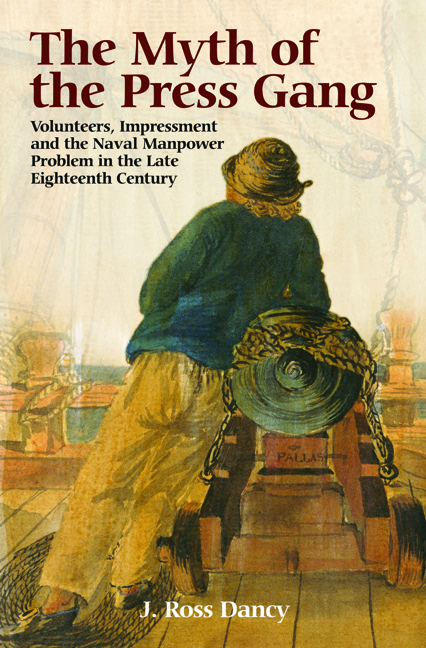 The Myth of the Press Gang
The Myth of the Press Gang Published online by Cambridge University Press: 05 May 2015
Few topics of eighteenth-century history have engaged both historians and the general public with such fervour yet have been depicted with less accuracy than impressment. Today, press gangs are probably the first thing most people think of when confronted with naval recruiting in the age of sail. Fiction and history alike have filled the popular mindset with images of press gangs dragging husbands from weddings and people who have no experience of the sea off to serve in what amounted to a seaborne dungeon. The images that have filtered down through the historiography have been of groups of oversized brutal men wielding clubs and walking the streets under the direction of a sadistic lieutenant, looking for any man unfortunate enough to stumble across their path, regardless of their skills as a seafarer. This view fits very well with the traditional view of navies in the age of sail; that is, the popular image of ‘rum, sodomy, and the lash’.
Manning the Royal Navy was a problem of immense proportions, and the problem had been growing increasingly throughout the eighteenth century, as the Navy, along with British sea trade, expanded. This resulted in ever-larger struggles for the scarce resource of skilled manpower, which made itself most evident during the initial mobilisation from peacetime to wartime footing. In the French Revolutionary Wars the problem was greater than ever before, as the Royal Navy had expanded from 17,000 in 1792 to over 130,000 men in 1801. Recruiting seamen in the eighteenth century was essentially a problem of mathematics, pitting the requirements of the Navy against the population of mariners available to draw upon. In the end there simply were not enough seamen to fully man the Royal Navy and the merchant fleets at the same time. By 1810 the Royal Navy had reached a size of over 145,000 men, which was 2.7 per cent of Britain's male population.
To save this book to your Kindle, first ensure no-reply@cambridge.org is added to your Approved Personal Document E-mail List under your Personal Document Settings on the Manage Your Content and Devices page of your Amazon account. Then enter the ‘name’ part of your Kindle email address below. Find out more about saving to your Kindle.
Note you can select to save to either the @free.kindle.com or @kindle.com variations. ‘@free.kindle.com’ emails are free but can only be saved to your device when it is connected to wi-fi. ‘@kindle.com’ emails can be delivered even when you are not connected to wi-fi, but note that service fees apply.
Find out more about the Kindle Personal Document Service.
To save content items to your account, please confirm that you agree to abide by our usage policies. If this is the first time you use this feature, you will be asked to authorise Cambridge Core to connect with your account. Find out more about saving content to Dropbox.
To save content items to your account, please confirm that you agree to abide by our usage policies. If this is the first time you use this feature, you will be asked to authorise Cambridge Core to connect with your account. Find out more about saving content to Google Drive.